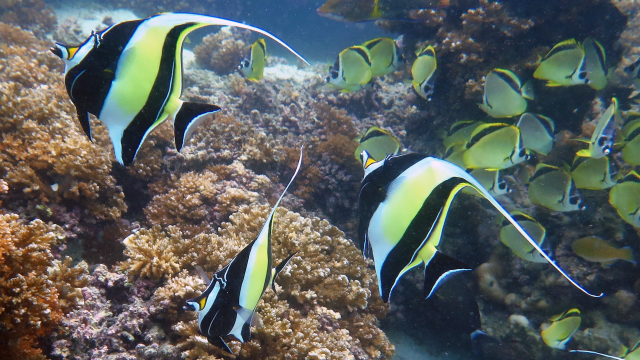Objectives
EASMO will investigate for the first time the impact of climate change on the distribution of reef fish throughout the Eastern Tropical Pacific Ocean considering cascading effects on biodiversity, ecosystem function, reefs’ contributions to people, climate feedbacks, and socio-economic wellbeing. Ultimately, it will deliver several layers of new scientific knowledge that can be directly integrated into decision-making tools, support adaptive transboundary governance approaches, and propel actions for meeting the UN Sustainable Development Goals 2 Zero Hunger, 13 Climate Action, and 14 Life Below Water.
Context
Species are on the move throughout the planet escaping hostile climatic conditions. These movements have advanced four times faster in the ocean than on land, causing dramatic ecosystem changes and redistributing resources across borders. The ecological, food security, and governance implications are obvious. Yet, two persistent gaps hinder our capacity to effectively manage coastal social-ecological systems to safeguard both fisheries and human wellbeing in the face of such challenges: i) regional studies documenting recent species redistributions have not quantified the societal repercussions, and ii) future projections have mapped expected catches and metrics of socio-economic impact (e.g. fisheries revenue) globally and at coarse resolutions, unfitting to support local or regional decision-making. Fish redistributions are particularly concerning, as three billion people depend on them for 15% of their animal protein intake. Although fish range shifts should be urgently investigated in the Global South, studies have focused disproportionately on wealthy parts of the world.
Project partner |
|---|
|
Prof. Jerry Tjiputra (NORCE) Prof. Fernando Zapata (Universidad del Valle) Dr. Cristina Sanchez (Fundacion MarViva) Dr. Albert Norström (Stockholm Resilience Centre) Prof. Jan McDonald (University of Tasmania) Prof. Mário Sousa (Universidade Nova de Lisboa) Prof. Christina Hicks (Lancaster University) Dr. Camilo Mora (University of Hawaii) Dr. Adriana Vergés (University of NSW Sydney) Dr. Juan Jose Alvarado (CIMAR Costa Rica) Dr. Fernando Rivera (Fundacion NAZCA, Ecuador) Dr. Hector Reyes-Bonilla (Universidad Autonoma de Baja California Sur, Mexico)
|





